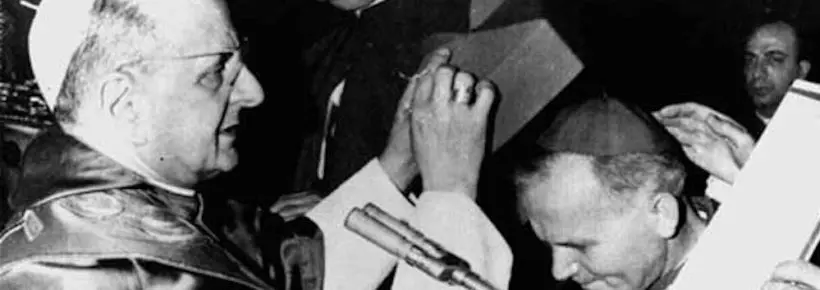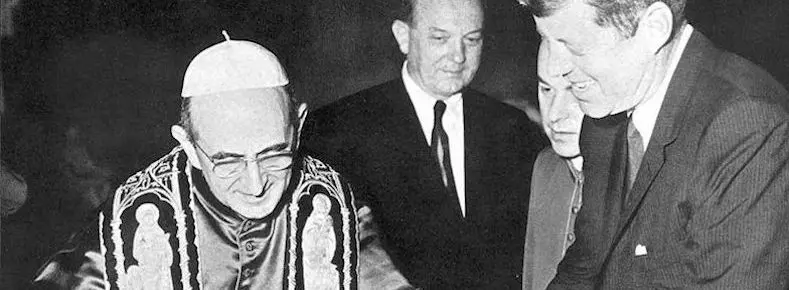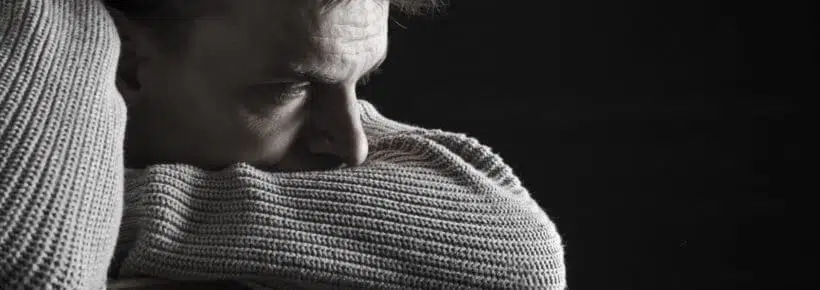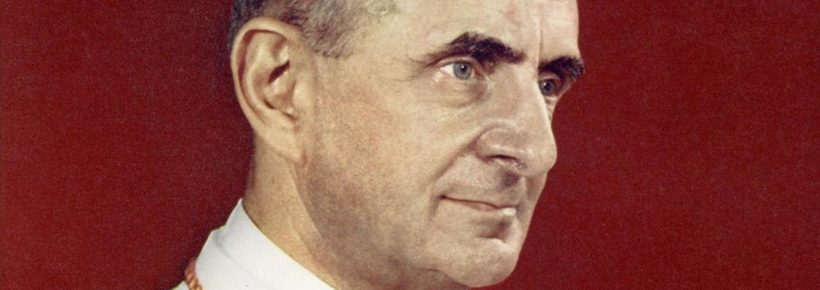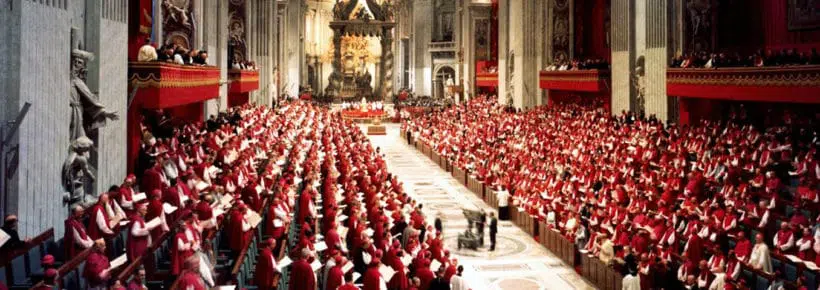Previous articles in this series:
- Part I: Introduction to Humanae Vitae
- Part II: The Predictions of Humanae Vitae
- Part III: The First Prophecy
- Part IV: The Second Prophecy
- Part V: The Third Prophecy
- Part VI: The Fourth Prophecy
- Part VII: Modernity’s Challenges to Humanae Vitae
Later articles in this series:
- Part IX: The Church’s Teaching Authority
- Part X: Principles of Humanae Vitae
- Part XI: The Moral Norm of Humanae Vitae
- Part XII: Doctrinal Objections to Humanae Vitae
- Part XIII: Pastoral Guidelines
What Authority Does the Catholic Church Have to Teach on Birth Control?
We ended the previous article of this series by indicating that St. Paul VI answered the questions that people of his time (and ours) had about birth control. Those very questions prompted the writing and publication of Humanae Vitae in 1968.
This question refers not only to St. Paul VI’s answers to questions about birth control, but also to the rest of the teachings in Humanae Vitae.
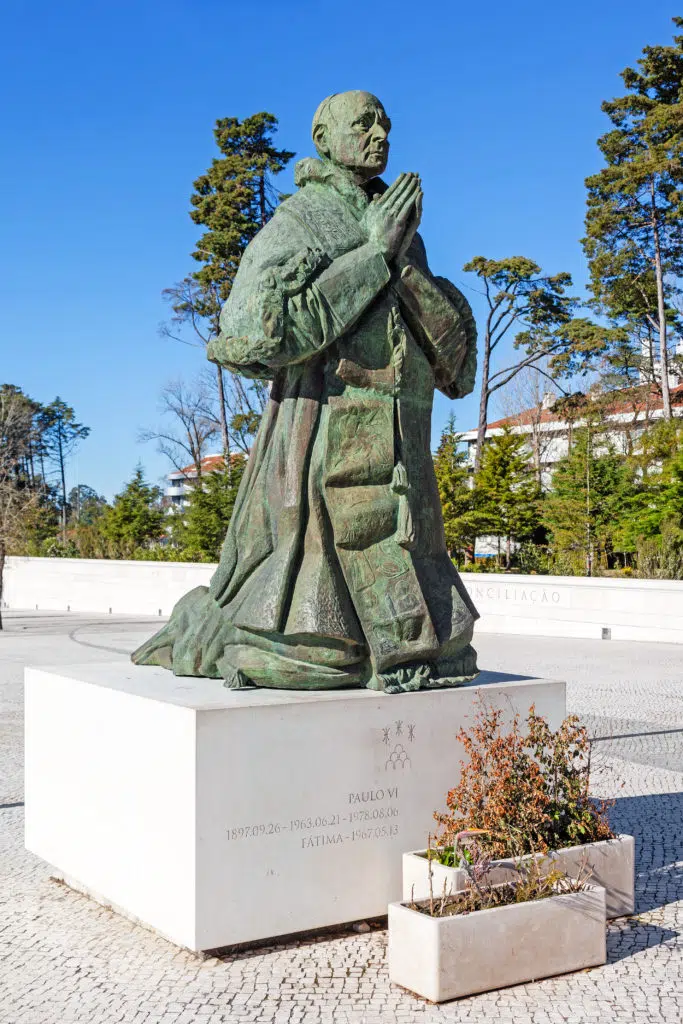
Statue of Pope St. Paul VI in the Sanctuary of Fatima by sculptor Joaquim Correia
It is true that the Catholic Church does not have a specific competence to teach about the scientific dimension of important human issues – although she does have plenty of scientists, both Catholics and non-Catholics, to consult with. But she does have a specific competence to teach about the moral dimension of any important human issue.
The reason for this latter assertion is that many important human values or goods are connected to important human affairs that lie outside of the Church’s specific competency. In the case of birth control, the values of conjugal love and procreation are at stake. Morality deals with human values that moral principles protect and foment. Thus, for example, the fundamental value of human life is protected by the commandment that prohibits murder. In short, the Church does have the authority to speak about the moral dimension of important facets of human existence, at both the individual and collective levels.
But How Does the Church Have the Authority to Teach on the Moral Principles of Social Issues beyond the Church’s Internal Affairs?
This latter question is important because people nowadays perceive birth control as a social issue that belongs to the privacy of married couples, something, they claim, the Church has no business meddling in.
But this objection is completely wrong. Jesus Christ commanded His Apostles and their successors (popes and bishops) to teach the way of salvation. The way of salvation includes obedience to the Ten Commandments, which Jesus never came to abrogate but to fulfill (Matt. 5:17). Now, the Ten Commandments contain the essence of the natural law (the universal moral law) that God has inscribed in the hearts of all peoples and, as such, binds in conscience every human person, believer or not (Catechism of the Catholic Church [CCC] 1955 and 1956; Rom. 2:14-16).
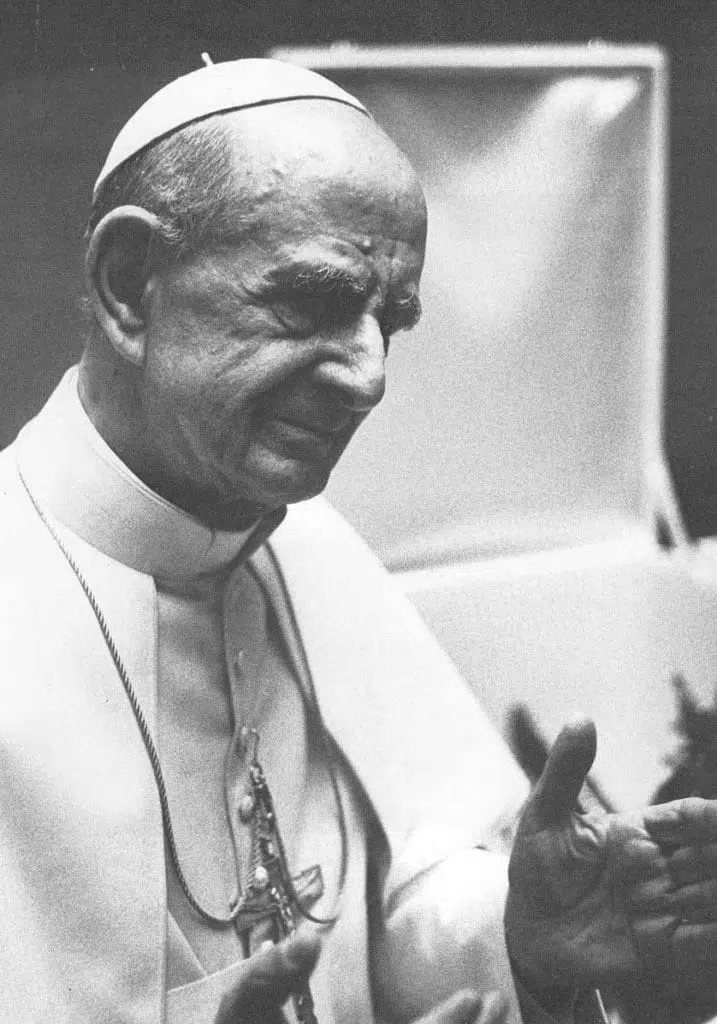
Pope St. Paul VI in 1977 (Attribution: Ambrosius007 at English Wikipedia, CC BY-SA 3.0)
The principles of the natural law protect fundamental human rights, such as the right to life, and the right marry and found a family. The Catholic Church, like any other human entity or individual, has the right to defend fundamental human rights.
Moreover, the goods of conjugal love and procreation evidently play an important role not only in the private lives of married couples but also in society as a whole. Few people can deny that the family, which is based on marriage and procreation, is the most important cell of society (CCC 2207). Therefore, these goods of conjugal love and procreation need the protection and guidance of moral principles, principles which belong to the natural law, which again is necessary for salvation.
And so, Jesus Christ gave His Apostles and their successors the authority to teach the natural law, not merely the laws of the Gospel (such as those promises, counsels, and commandments Christ declared in His Sermon on the Mount, Matt. 5-7).
From all the above points we can conclude the following:
The Church, the “pillar and bulwark of the truth” (1 Timothy 3:15), has received this solemn command of Christ from the apostles to announce the saving truth. To the Church belongs the right always and everywhere to announce the moral principles, including those pertaining to the social order, and to make judgments on any human affairs to the extent that they are required by the fundamental rights of the human person or the salvation of souls. (CCC 2032)
But Not Everybody Agrees the Natural Law Exists and Binds All Human Beings
Isn’t the Natural Law Just Another Invention of the Church?
The natural law transcends the Catholic Church. The Church does not have a monopoly on the natural law, because this law pertains to human reason—that is, to all humanity.
Since ancient times pagan philosophers have acknowledged the existence of the natural law. For example, the first-century Roman thinker Cicero wrote:
For there is a true law: right reason. It is in conformity with nature, is diffused among all men, and is immutable and eternal; its orders summon to duty; its prohibitions turn away from offense…. To replace it with a contrary law is a sacrilege; failure to apply even one of its provisions is forbidden; no one can abrogate it entirely. (Rep. III, 22, 33. Quoted in CCC 1956.)
Many people would still disagree with the assertion that the natural law exists and that it is the same for everybody. But it is not difficult to demonstrate that they are wrong. How can a society be just, or even survive, if it condones murder, theft, sexual immorality, or social injustice? How can there be human solidarity and unity without the objective existence of fundamental moral principles?
It is easy to see that the essential principles of the natural law are universal. It is not difficult to conclude that the important values or goods of marriage, conjugal love, procreation, and the family are also natural and universal.
From all the above points, St. Paul VI comes to the following conclusion in Humanae Vitae:
This kind of question [about birth control] requires from the teaching authority of the Church a new and deeper reflection on the principles of the moral teaching on marriage—a teaching which is based on the natural law as illuminated and enriched by divine Revelation. No member of the faithful could possibly deny that the Church is competent in her magisterium to interpret the natural moral law. It is in fact indisputable, as Our predecessors have many times declared, that Jesus Christ, when He communicated His divine power to Peter and the other Apostles and sent them to teach all nations His commandments, constituted them as the authentic guardians and interpreters of the whole moral law, not only, that is, of the law of the Gospel but also of the natural law. For the natural law, too, declares the will of God, and its faithful observance is necessary for men’s eternal salvation. (Humanae Vitae 4)
Therefore, the Catholic Church does have the right, duty, and authority to teach about the values at stake in issues of birth control or family planning.
However, we still have to discuss what exactly the teaching authority of the Catholic Church is, and also whether the teaching in Humanae Vitae is infallible. We need to answer these questions because many Catholics are not practicing the teachings contained in Humanae Vitae, and some of them even question if this teaching is serious enough to require obedience.
Answering these questions will be the subject of the next article in this series.
Previous articles in this series:
- Part I: Introduction to Humanae Vitae
- Part II: The Predictions of Humanae Vitae
- Part III: The First Prophecy
- Part IV: The Second Prophecy
- Part V: The Third Prophecy
- Part VI: The Fourth Prophecy
- Part VII: Modernity’s Challenges to Humanae Vitae
Later articles in this series:
- Part IX: The Church’s Teaching Authority
- Part X: Principles of Humanae Vitae
- Part XI: The Moral Norm of Humanae Vitae
- Part XII: Doctrinal Objections to Humanae Vitae
- Part XIII: Pastoral Guidelines
Related Content
Adolfo is the Director of Education for Hispanic Outreach for Human Life International and of HLI's Hispanic outreach arm Vida Humana Internacional. He has a Masters in Theology from St. Vincent de Paul Regional (Major) Seminary and a License in Moral Theology from the Alphonsian Academy in Rome.
Adolfo has traveled frequently to VHI’s affiliates in Latin America to give talks, training sessions, and media interviews. He has authored and co-authored books, articles, reports, and a pro-life training course for Hispanics in the U.S. Adolfo has also participated in the production of two TV pro-life series in Spanish, which have been aired through EWTN en Español.


